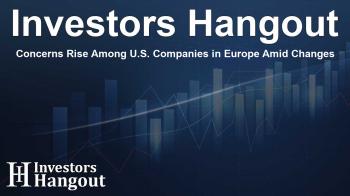Concerns Rise Among U.S. Companies in Europe Amid Changes

U.S. Companies Brace for Impact in European Market
Recent surveys indicate a growing concern among U.S. firms in Europe regarding the future of transatlantic economic relations. Nearly nine out of ten companies express worries that these relations will deteriorate due to the anticipated policies of the new U.S. administration.
Understanding the Survey Results
Conducted by the American Chamber of Commerce to the European Union (AmCham EU), the survey involved responses from over 58 U.S.-controlled companies. Among those surveyed, major names like Apple, Goldman Sachs, Meta, and Visa highlighted that approximately two-thirds expected U.S. policies to disrupt their European operations negatively.
Impact of Incoming Policies
Many cited specific worries, particularly around tariffs and changes in trade policy, as top priorities influencing their business strategies. A significant portion of the respondents, around 84%, deemed tariffs and trade policy critical for fostering transatlantic cooperation, emphasizing the importance of maintaining robust economic ties between the U.S. and Europe.
European Policies at Play
Interestingly, more than half of the firms, about 52%, anticipate that European Union policies could also pose challenges to their operations. Companies are calling for a collective effort from both the EU and the U.S. to reduce regulatory burdens, lower trade barriers, and enhance cooperation across various sectors.
Environmental Commitments at Stake
Another key finding from the survey highlighted the strong support for the Paris climate agreement among U.S. businesses in Europe. An impressive three-quarters of respondents expressed their commitment to the agreement, a stance likely to be impacted by the incoming administration, which may seek to withdraw from such global commitments. Only a mere 2% of those surveyed were against this environmental pact.
The Road Ahead
As these firms navigate potential shifts in policy and regulation, their concerns illustrate the broader implications of political changes on international business dynamics. U.S. companies are eager for assurances that their vital operations in Europe will be considered in forthcoming trade discussions.
Frequently Asked Questions
1. Why are U.S. companies concerned about European operations?
U.S. companies fear that new tariffs and trade policies from the U.S. administration may negatively affect their operations in Europe.
2. What was the main focus of the survey conducted by AmCham EU?
The survey aimed to assess U.S. companies' expectations regarding transatlantic economic relations and the anticipated impact of U.S. policies.
3. How many companies participated in the survey?
There were 58 U.S.-controlled members that participated in the survey organized by the American Chamber of Commerce.
4. What key issues did the survey respondents prioritize?
Survey respondents ranked tariffs and trade policies as top priorities for improving transatlantic cooperation, along with supply-chain resilience.
5. What stance did U.S. companies take on the Paris climate agreement?
Around 75% of surveyed U.S. companies expressed strong support for the Paris climate agreement, highlighting their commitment to environmental initiatives.
About Investors Hangout
Investors Hangout is a leading online stock forum for financial discussion and learning, offering a wide range of free tools and resources. It draws in traders of all levels, who exchange market knowledge, investigate trading tactics, and keep an eye on industry developments in real time. Featuring financial articles, stock message boards, quotes, charts, company profiles, and live news updates. Through cooperative learning and a wealth of informational resources, it helps users from novices creating their first portfolios to experts honing their techniques. Join Investors Hangout today: https://investorshangout.com/
Disclaimer: The content of this article is solely for general informational purposes only; it does not represent legal, financial, or investment advice. Investors Hangout does not offer financial advice; the author is not a licensed financial advisor. Consult a qualified advisor before making any financial or investment decisions based on this article. The author's interpretation of publicly available data presented here; as a result, they should not be taken as advice to purchase, sell, or hold any securities mentioned or any other investments. If any of the material offered here is inaccurate, please contact us for corrections.
